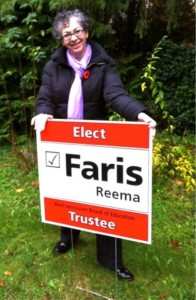Posts Tagged ‘Teachers’
Year One Retrospective
A year ago, I was elected as a Trustee to the West Vancouver Board of Education and it’s been an honour to work on behalf of this community. I’ve lived most of my life here, I’m a graduate of the school district in which I now play a role, and I’m fortunate I’m able to raise my child here.
As a public education community, we’re very lucky in West Vancouver. We have a great administrative team, we have inspiring leadership from our Superintendent, we have incredible staff, we have a caring Board, and we have a cadre of educators who are diligent, dedicated, and determined to deliver the highest quality teaching and learning.
We’re also favoured in that our community highly values education and families here generally have the means to ensure the best for their children. And yet, even with all these advantages, I see any number of troubling issues which appear to characterize the public education system in British Columbia.
And so, when I’m asked about my experience as a Trustee, my inclination is to say that the system is more complex and complicated than I realized despite having been an active parent-volunteer for five years before choosing to run for office.
Why?
In part, I think, because there are many different interpretations of the generally agreed upon underlying principle which I see as “the best interest of the child”.
Is the core purpose of education the success of the individual child or is it the betterment of society? Do parents know what’s best for their child or do teachers? Is an educator an autonomous professional or an expert member of a team?
I’m sure any one of us could generate an endless list of questions on the big picture of education, but then there are the practicalities. How is the provincial government able to show that funding per pupil is at an all time high while school districts have to nip, tuck, or cut programs and services in order to balance budgets? Given that 80% of a school district’s budget is consumed by salaries and benefits, how can innovative projects be implemented when resources are so constrained? How can infrastructure be maintained and new capital projects be contemplated with no additional funding?
Despite the seemingly intractable challenges, there’s no doubt in my mind that we have to do everything we can to foster dialogue on this issue. That education needs to be made the highest priority in this province, that we have to find a way to work collaboratively to make our strong system better.
The reason is simple. Education is the path to a more just and more equitable world.
And while it may be difficult to hold on to this truth given the evidence of the harm humans continue to do to the earth and to each other, it is why I remain committed to doing the best I can, for public education, in the remaining two years of my term.
One… Two… Three Questions About Education In BC
1. Is it time to flip the classroom on teacher education?
After receiving my B.A. from UBC in 1983, I went on to complete the one year professional teaching program. To complete my course of studies, I was required to do three separate practicums, two in the Lower Mainland and one outside of it, for a total of eight weeks of classroom experience.
As the saying goes, life is what happens when you make plans and I never did become a full-time classroom teacher. Reflecting back, I wonder how I would have coped in a classroom with so little direct experience. I’m not fully versed on the changes that have taken place with the professional programs since then, but I still wonder if teachers get enough of an introduction to the career they’ve selected.
What if it’s time to flip the classroom on teacher education? What if less time were spent on a university campus and more time in a K-12 classroom? What if student teachers were paid a living wage, worked during the school year, and did course work in the summer? With such a model, would we benefit by having a second adult in a classroom to assist teachers with the increased demands of inquiry-based teaching and support students with their personalized learning? Would we gain teachers who are better prepared for classrooms comprised of many students with special needs including many more English Language Learners? Teachers who had more direct knowledge of the career they’ve chose? In this way, would we be able to provide more staff to better support all students in their many and varied learning styles?
2. What do parents want?
There are many things parents want and expect from the public education system. I’m not going to launch into enumerating the laundry list of expectations, but here’s the one “request” which I believe is paramount. Parents, I believe, would like the needs of their children to be assessed and met on a timely basis without having to bang on drums for attention or to wait and wait and wait and to have measures introduced much too late in a child’s progress and development. Yes, this is an issue of resources, but it is also an issue of responsiveness in schools and understanding that the children losing out are not always those with the most easily identifiable needs. The children who are significantly at risk, it seems to me, are those who may appear typical but whose needs, if neglected, result in bad behaviour and consequences much more severe than they might have been had interventions been introduced earlier.
3. How do we define school?
It seems to me that we have a picture of school as it was, as it is, and as it ought to be. I think there’s general agreement that the most successful model will be one which is student-centered. If we agree on such a fundamental principle, why can’t we find a way to work together to build that model so that when talking about the world’s best school system, BC is referred to as often, if not more often, than Finland?
Is There Another Way ?
I walked around my son’s school yesterday to thank each teacher for their work and to express how sorry I was at the way events are unfolding in public education in British Columbia.
Why?
Because I value teachers and the work they do. Because these teachers, whether early in their careers or with many year’s experience, are caught up, as I am, in forces seemingly beyond our control.
 We are spectators to a drama that is playing out on a stage where provincial representatives, whether union or government, cannot find a way to talk to each other. In the absence of dialogue, labeling and name-calling have become the norm. In the absence of a willingness to work towards compromise, brinksmanship has become the norm whether by using the media, social media, or the mechanisms of legislation.
We are spectators to a drama that is playing out on a stage where provincial representatives, whether union or government, cannot find a way to talk to each other. In the absence of dialogue, labeling and name-calling have become the norm. In the absence of a willingness to work towards compromise, brinksmanship has become the norm whether by using the media, social media, or the mechanisms of legislation.
And as much as it is being said that teachers are not shown respect, I feel respect is not being shown towards others in the educational community such as administrators, Trustees, or parents. This disrespect has pervaded the discourse and was on display during George Abbott’s recent Twitter chat. Whatever you may think of the man, his role, and the government he represents, were the derogatory personalized attacks warranted? If you call him a bully or see him as one, is the appropriate response to bully him?
So if our system is dysfunctional, which only serves to harm the interests of those it’s purporting to serve, is there another way forward?
During a recent liaison meeting with administrators, we watched a TEDTalk by Seth Godin in which he talks about starting movements to bring about change.
I’m not sure how and I’m not sure when and I may not be the person to do it, but I would like to start a movement for change in the BC public education system.
To start, I would like to call for a Royal Commission on Education. There hasn’t been one held in BC since 1987, the results of which were captured in a 1988 report entitled A Legacy for Learners.
While expensive and time-consuming, I believe that this high-level, independent, wide-ranging forum is the only way we can capture the big picture of education, its purpose, its link to society, and the way in which its objectives can be fulfilled in the best interest of the students.
I would also suggest, as our understanding has grown over the last 25 years, that a more holistic approach be taken. To truly effect societal change we need to consider education as only one component in a child’s life which links to health and socio-economic well-being among other factors. This would be one way to capture information from other Ministries which may lead to conclusions and recommendations that are transformative in the way we structure programs and services which most affect children and families in this province.
After all, it’s all about the children, isn’t it?
